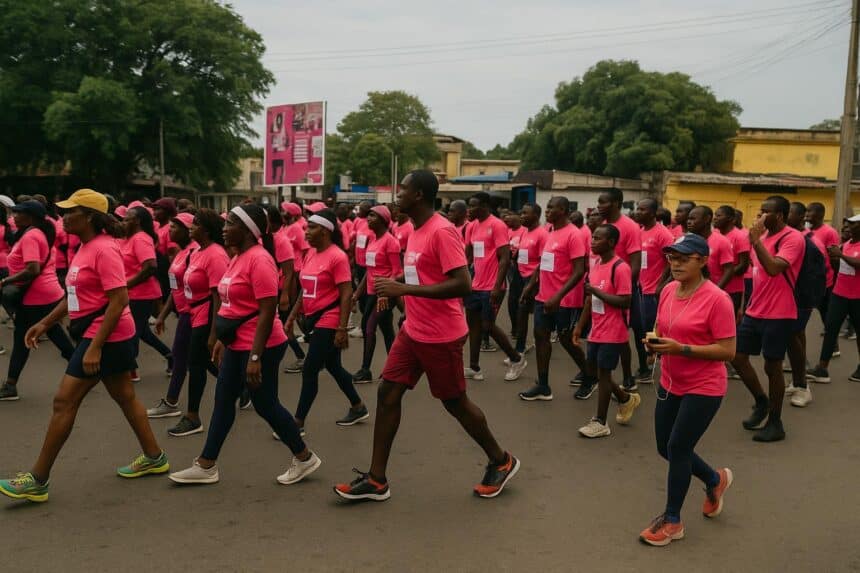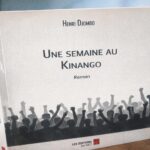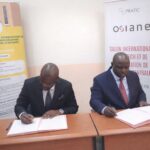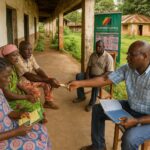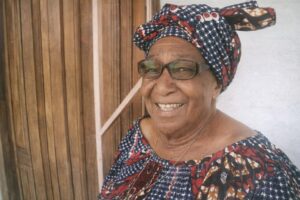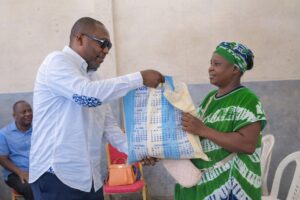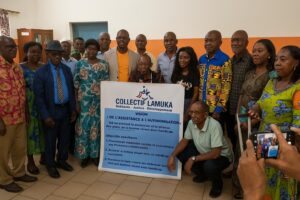An Avenue Turns Pink for Awareness
Saturday morning sunlight bounced off a sea of rose-coloured T-shirts as the multisport club Lion d’or opened its cancer campaign on the city’s iconic corniche. Music, drums and bright banners replaced the usual traffic, creating a festive yet purposeful mood.
Club president José Cyr Ebina told onlookers the goal was simple: make cancer impossible to ignore. “If the street can vibrate for football, it can vibrate for our mothers and sisters,” he said, urging spectators to join the start line rather than watch from cafés.
Five- and Ten-Kilometre Challenge Details
Two routes were mapped to suit all fitness levels. Walkers covered five kilometres from Hôtel Saphir to the De Gaulle roundabout via Mami Wata, while seasoned runners extended to the Bolingo junction for a ten-kilometre loop before sprinting back to the starting arch.
Volunteer stewards dotted the course, handing out water and cheering every finisher. Passing motorists slowed, some honking in rhythm with the DJ, transforming the normally brisk thoroughfare into a moving classroom on early detection.
Voices from the Track: Inclusive Courage
Among the loudest applause was the arrival of Rodolph Gassaye Mouandza, a visually impaired participant guided by fellow athletes. He crossed the tape smiling, then raised his cane in triumph. “Cancer does not discriminate, and neither should prevention,” he declared.
His message hit home: women with disabilities face extra barriers to screening. He urged regular self-exams and hospital visits, reminding the crowd that courage sometimes starts with a phone call to schedule a test.
Women Talk Seminar Spreads Lifesaving Tips
The march was preceded by an interactive forum dubbed “Woman Talk” or “Massolo ta bassi” in Lingala, held in a downtown auditorium packed with delegates from Congo, Gabon and the Democratic Republic of Congo.
Facilitators scrapped slides for dialogue, inviting participants to share myths they had heard—ranging from “tight clothing causes cancer” to “screening guarantees surgery.” Each misconception was unpacked by specialists, leaving attendees with practical facts and a resolve to become peer educators.
Mid-session, survivors took the microphone. Mireille, a 42-year-old teacher, recalled discovering a lump during a routine self-exam. “Early testing spared me chemotherapy,” she said, sparking visible relief among listeners who had feared the worst outcomes.
Doctors Outline Risks and Prevention Paths
On stage, oncologist Dr Brenda Mavoungou listed modifiable risks: smoking, processed food, sedentary habits and unprotected early sexual activity that heightens HPV exposure. Genetics matter, she added, but lifestyle shifts can tip the odds.
Gynaecologist Dr Patrick Ibara demonstrated self-palpation techniques using a model torso, then passed it around the room until every participant felt comfortable identifying suspicious nodules.
Nutritionist Diane Nzondo linked diet to prevention, promoting local staples like saka-saka and fresh fish over imported processed snacks. “Healthy does not have to be expensive,” she stressed, mindful of rising food prices.
The medical panel insisted that screening be part of routine life, just like renewing a driving licence or paying utility bills—mundane but non-negotiable acts of responsibility.
Next Steps After October’s Momentum
Ebina reminded the audience that October’s pink ribbon hands the baton to November’s blue campaign against prostate cancer and December’s red drive for HIV testing. “We do not fold the tents after one month,” he joked, pledging continued activities.
Part of the funds collected from registration fees and corporate sponsors will flow to women-led associations that coordinate transport vouchers for hospital visits, ensuring the poorest are not left on the roadside of prevention.
Lion d’or also announced monthly mini-runs in each arrondissement, aiming to decentralise awareness so residents of Makélékélé or Talangaï no longer have to travel downtown for information.
A mobile clinic, supplied jointly with the Health Ministry, is scheduled to accompany those runs, offering on-site HPV vaccinations and breast exams, an initiative applauded by local councillors present at the ceremony.
Community and Policy Synergy
City hall’s sports department promised logistical support, citing the event’s clean record on safety and traffic flow. “We see sport as a public-health tool,” director Aimé Diawara noted, hinting at future collaborations.
Medical NGO partners backed the approach, arguing that community mobilisation eases pressure on clinics by catching cases earlier. They cited World Health Organization figures showing survival rates doubling with early detection.
For participants like student Francine Mbemba, the takeaway was personal yet universal: “I came for the workout and left with knowledge that could save my aunt’s life,” she said, holding the pamphlet she planned to translate for her village WhatsApp group.

